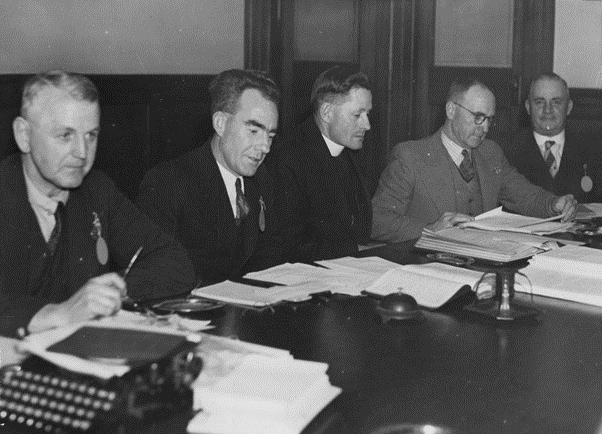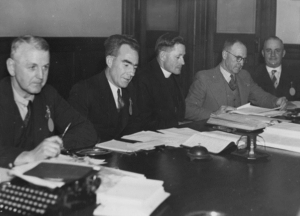WE.A. AND W.S.S.S.
Mr. J. J. M’Laughlin, Sunnybank, writes:-
When moving for a hostile pronouncement in regard to the attitude of the Workers’ School of Social Science towards the Workers’ Educational Association Mr. Freeberg makes very clear “that there is a class struggle,” and Interprets the objective of the worker movement very clearly and definitely when he says: “The aim of the working class is to substitute an economic and social system in which the employer will no longer exist.” I trust the pronouncement will contain loss of the flowery verbiage, of aspiration, and fuller details of the new system to he substituted for mastery: and congratulate the W.S.S.S. on their choice of a really capable writer on this important social problem. Mr. Freeberg says: “The very essence of working class education must he the enlightenment of the workers and their equipment with the scientific truth necessary to fit them to bring about the ‘Labor objective,’ that is, emancipation from mastery, a boycott of money capital. and the complete socialisation or ownership—presumably by the Government—of the machinery of production without further mortgaging- ourselves and posterity to the money lender.”
It will he very disappointing if the pronouncement does not go beyond the Marxian prophecy that surplus profit will automatically reduce the middle and working class to the level of the dispossessed. This will bring red revolution, and in the confusion the organised Communists will seize the administrative power and declare a proletariat dictatorship, etc. When Carl Marx [sic] predicted this inevitable consequence, as the result of continuing the present system of private capital, he never dreamed of the establishment of national capital as a substitute for financing a people any more than the first astronomer, who believed in the earth being the centre of the universe could conceive that it was in reality the sun. This then is the problem ((irrespective of who govern the schools of thought, University or unions). By what definite and familiar process are the two schools educating the workers for the era of reconstruction? The impartial teaching of the W.E.A. demonstrates that the class struggle is shaking the foundations of capitalist society, that institutions such as mastery, finance, unnecessary production, monopoly of natural resources, and even government itself have become contemptible, through the incapacity of those In power to reorganise society on a basis of Justice, opportunity and better maintenance of life and happiness.
As facts speak louder than words, and before casting a slur, let us examine the recent effort of the W.E.A. Congress in introducing national finance as a means to carrying out our public works without interest to capitalists, and in absorbing the unemployed in creating national wealth, and giving that opportunity for life and co-operation which has been the dreams of all reformers.
Two nights were devoted to this important substitute for red revolution, and Mr. Frank Anstey, M.H.R., in a most illuminating address advocated from a W.E.A. platform the repayment to all bond holders of the Federal war debt—thus saving forty million pounds annually in interest—by establishing national credit in the Commonwealth Bank, the amount to be represented by our present currency, and redeemable in any form of procurable wealth desired by the bond holder.
I also had the privilege on that occasion to speak on behalf of a policy of national credit as a substitute for the private and costly article which all classes in society and every Marxian must admit constitutes the power by which mankind is robbed at the point of production. I trust I have made it clear. Whether the W.E.A, takes sides, class consciously or not, it gets there just the same. Any individual student is at liberty to advocate reform either by means of press or platform. And that is all we can expect from our class-conscious comrades of the W.S.S.S.
P.S.—There is not the slightest doubt that the prominence given to the nationalisation of credit by “The Daily Standard” during the last five years has had great educational value in hastening the financial reform which name into operation last December when the Commonwealth note Issue department was transferred from the Treasury to the Commonwealth Bank, so that now the whole machinery of national finance is available to the public on approved security, whereas previously only banks could be accommodated on depositing one-fourth in gold. Our next step in this great reform is to agitate for loans to Governments and public bodies at the nominal interest of 1 per rent, thus recognising as security valuable public improvements created by Labor. Later this cheap money will be the means of liberating thousands of our people from the stranglehold of mortgage and exorbitant interest.—J, J. M’L.
From Daily Standard, Wednesday 23 February 1921, page 3.
Image: Meeting of the Annual conference of the Protestant Labour Party at the Builders Exchange, 1939, SLQ 425316, State Library of Queensland.


